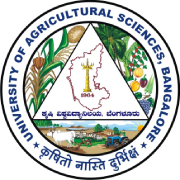
DIVISION OF AGRICULTURAL BIOTECHNOLOGY
Biotechnology is very well accepted in the field of medicine. Similarly, Biotechnology is already contributing to the agriculture sector. The relevance of biotechnology is becoming prominent in this era of climate change. New tools and technologies are being discovered in biotechnology that is used to improve crops precisely and in a short duration of time. To name a few, doubled haploid technology, Gene editing technology, Marker Assisted Selection etc. Realising the importance of biotechnology in agriculture, B.Sc. (Agri. Biotechnology) UG programme was started at the Hassan campus of UAS Bangalore in the academic year 2007-08. In the year 2017-18, the degree nomenclature was changed to B.Tech. (Biotechnology) and adopted the fifth Dean’s committee course curriculum. M.Sc. (Agri.) in Molecular Biology and Biotechnology is started in the academic year 2022-23 at the Hassan campus. Division of Agricultural Biotechnology is comprised of four departments namely the Department of Plant Biotechnology, Department of Microbial and Environmental Biotechnology, Department of Biochemistry and Department of Bioinformatics. Each department offers several courses for the UG Biotechnology degree programme. The unique feature of the Biotechnology degree programme on this campus is, to impart biotechnology skills to the students in addition to strong theoretical knowledge. Students’ mind is stimulated to think to resolve local agricultural problems using their biotechnology knowledge and skills. This will convert the students from job seekers to job providers by the time they complete their degree programme.
CONSTITUENT DEPARTMENTS AT DIVISION OF BIOTECHNOLOGY
- DEPARTMENT OF PLANT BIOTECHNOLOGY
This department focuses on educating and training students B.Tech. (Biotech.) students on the various aspects of Plant biotechnology. Nearly 18 courses covering from cell biology to advanced courses like molecular diagnostics, nanobiotechnology. This a major department of this division with 44 credits offered to B.Tech. (Biotech.) students. Students are exposed to the history of discoveries of various aspects of biotechnology, trained in various principles and techniques of biotechnology like Genetic engineering/recombinant DNA technology, molecular markers, marker assisted breeding and plant tissue culture. These courses are also offered as Hands on Training during the last year as part of student READY program to empower the students with biotechnological skills. The department also offers the students of B.Sc. (Hons. Agri.) a course on Introductory Biotechnology to expose them to basic of plant biotechnology. These students also take part in learning Tissue culture during the Hands-on Training course during the last year as part of the student READY program.
- DEPARTMENT OF MICROBIAL AND ENVIRONMENTAL BIOTECHNOLOGY
This department basically focuses educating B.Tech. (Biotech.) students on approaches of engineering micro-organisms using biotechnological tools for the benefit of mankind and the environment. The department offers courses on Introductory Microbiology, Food biotechnology, Microbial Genetics, Green Biotechnology, IPR, Biosafety and Bioethics that are taught across the 4 years of degree program. By the end of the degree program, the students must be able to understand the use and application of microbial and environmentalbiotechnology. In addition, the department also offers Introduction to Food Biotechnology for B.Tech. (Food Tech.) students that covers the basics of molecular nature of gene, recombinant biotechnology and its application in food industry.
- DEPARTMENT OF BIOCHEMISTRY
This Department focuses on educating B.Tech. (Biotech.) and B.Sc. (Hons.) Agri. on some of the basics of Biochemistry, Enzymology and Immunology. The students are educated on various macro molecules of the cell like carbohydrates, proteins, lipids and nucleic acids, their structure, biosynthesis and function in the cell. It helps in students to understand the basics of how living things function. Basically, understand life at cellular and molecular level. History of various discoveries and principles are discussed that led to the development of field of biochemistry. Students are exposed to various techniques and technologies developed in biochemistry that advance our understanding. The courses on Plant biochemistry, enzymology, enzyme technologies, biochemical techniques and immunology are taught over the period of 4 years to comprehend Biochemistry. By the end of the course, the students must be able to understand the chemical basis of biological molecules and the process that occur in living cells that helped in the functioning of different tissues and organs.
- DEPARTMENT OF BIOINFORMATICS
The Department of Bioinformatics, Division of Biotechnology, College of Agriculture, Hassan focuses on teaching and training of undergraduate students of B.Tech. (Biotechnology) in the field of Bioinformatics which is an interdisciplinary subject with the objective of Database search, use of bioinformatic tools, and algorithms to analyze and interpret biological data, particularly for crop protection and improvement. The department offers bioinformatics courses viz. Introductory Bioinformatics, Genomics, and proteomics of different living organisms in general and Agricultural crops in particular, Computational Biology to determine the 3-dimensional structures of biological molecules, and Metabolomics and System Biology to understand the metabolic pathways to identify the potential genes involved through in silico approaches. The department also focuses on hands-on training for the students on Bioinformatics tools, Genomic and Proteomics databases to retrieve biological data and analysis, and Molecular docking for drug discovery.

M.Sc. (Agri), PhD (Crop Physiology), PDF
Molecular aspects of biotic and abiotic stress resistance in plants

M.Sc. (Agri.), PhD (Crop Physiology), PDF
Developmental Physiology, Abiotic and biotic stresssignalling and tolerance mechanism
-
- ಪುಟ ಸಂದರ್ಶಕರ ಸಂಖ್ಯೆ:
- ಕೊನೆಯದಾಗಿ ನವೀಕರಿಸಲಾಗಿದೆ: ಮಾರ್ಚ್ 19, 2025
- ಸೈಟ್ ಅಂಕಿಅಂಶಗಳು





